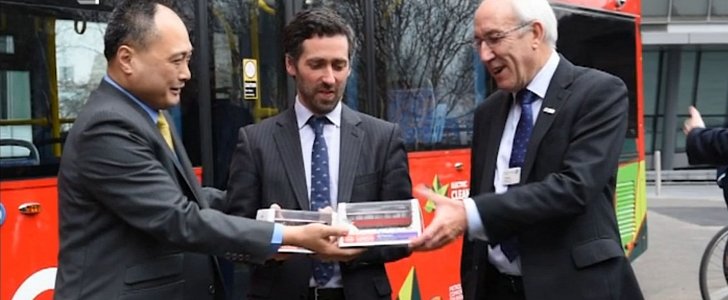The famous double deck bus is probably one of the most emblematic symbols of London, along with the Big Ben and another vehicle used in public transportation: the black London Taxis.
As fond as the Londoners are of their iconic vehicles, there's no getting around the fact that England's capital city is one of the most polluted in Europe, especially in the crowded downtown. Unlike other metropolises around the world, London does have a decent public transport system both above and underground, and a lot of people don't have any problem using it. Being seen jumping off a double deck bus as it's still moving is actually cooler than stepping out of most cars, so those worried about their personal rating can relax when in London.
However, the large diesel buses do little to prevent the escalation of air pollution, even though a modern Routemaster hybrid bus has recently entered service. Capable of carrying 87 people, the diesel-electric bus is clearly less polluting than 87 cars, but it's still releasing considerable quantities of CO2 and NOx into the already saturated London air. The only way that could be curbed is an all-electric vehicle.
The Transport for London (TfL) made a move in that direction and ordered a prototype electric double deck bus that it will test out on route 98. The price of the vehicle hasn't been made public, but the authorities suggested it's more expensive than the new Routemasters, which cost the equivalent of $500,000. In the long run, though, due to lower running costs, the TfL is hopeful the electric buses will be more convenient financially, as well as environmentally.
With an estimated maximum range of 180 miles (290 km), the bus can run for a whole day without the need of a recharge, getting its batteries filled up in the depot overnight. Like any self-respecting EV, it's got brake energy regeneration system and intelligent software that makes the most of the power available while also making sure none is wasted. Still, during the hot summer months - when the AC will be on - or the cold winter months - when batteries lose some of the efficiency -, the estimated maximum range might suffer.
Quoted by Standard, Leon Daniels, TfL director of surface transport, said, "We know London's air quality is not as good as it should be. Cutting their [the buses'] emissions will make a material difference to London's air quality."
While all that might be true, there's one little aspect nobody's talking about: tourist safety. Things were already pretty difficult, having to look first right and then left when crossing the road, now we're going to have to watch out for stealthy big read buses as well with their silent electric motors.
However, the large diesel buses do little to prevent the escalation of air pollution, even though a modern Routemaster hybrid bus has recently entered service. Capable of carrying 87 people, the diesel-electric bus is clearly less polluting than 87 cars, but it's still releasing considerable quantities of CO2 and NOx into the already saturated London air. The only way that could be curbed is an all-electric vehicle.
The Transport for London (TfL) made a move in that direction and ordered a prototype electric double deck bus that it will test out on route 98. The price of the vehicle hasn't been made public, but the authorities suggested it's more expensive than the new Routemasters, which cost the equivalent of $500,000. In the long run, though, due to lower running costs, the TfL is hopeful the electric buses will be more convenient financially, as well as environmentally.
With an estimated maximum range of 180 miles (290 km), the bus can run for a whole day without the need of a recharge, getting its batteries filled up in the depot overnight. Like any self-respecting EV, it's got brake energy regeneration system and intelligent software that makes the most of the power available while also making sure none is wasted. Still, during the hot summer months - when the AC will be on - or the cold winter months - when batteries lose some of the efficiency -, the estimated maximum range might suffer.
Quoted by Standard, Leon Daniels, TfL director of surface transport, said, "We know London's air quality is not as good as it should be. Cutting their [the buses'] emissions will make a material difference to London's air quality."
While all that might be true, there's one little aspect nobody's talking about: tourist safety. Things were already pretty difficult, having to look first right and then left when crossing the road, now we're going to have to watch out for stealthy big read buses as well with their silent electric motors.

